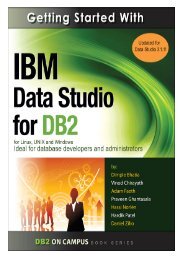Managing Computers in Large Organizations
You also want an ePaper? Increase the reach of your titles
YUMPU automatically turns print PDFs into web optimized ePapers that Google loves.
<strong>Manag<strong>in</strong>g</strong> Microcomputers <strong>in</strong> <strong>Large</strong> <strong>Organizations</strong><br />
http://www.nap.edu/catalog/167.html<br />
About this PDF file: This new digital representation of the orig<strong>in</strong>al work has been recomposed from XML files created from the orig<strong>in</strong>al paper book, not from the<br />
orig<strong>in</strong>al typesett<strong>in</strong>g files. Page breaks are true to the orig<strong>in</strong>al; l<strong>in</strong>e lengths, word breaks, head<strong>in</strong>g styles, and other typesett<strong>in</strong>g-specific formatt<strong>in</strong>g, however, cannot be<br />
reta<strong>in</strong>ed, and some typographic errors may have been accidentally <strong>in</strong>serted. Please use the pr<strong>in</strong>t version of this publication as the authoritative version for attribution.<br />
A PERSPECTIVE FOR THE CHIEF EXECUTIVE OFFICER 73<br />
require a significantly higher level of control s<strong>in</strong>ce they affect the jobs of many<br />
people and may be the repository for corporate records. The danger is that<br />
personal computer activities may grow <strong>in</strong>to departmental systems without the<br />
necessary controls.<br />
The most frequently discussed issues concern<strong>in</strong>g the use of personal<br />
computers <strong>in</strong> bus<strong>in</strong>ess may be grouped <strong>in</strong>to five categories:<br />
• data management;<br />
• product proliferation;<br />
• acquisition practices;<br />
• level of user maturity;<br />
• the shift <strong>in</strong> skill sets.<br />
Data management means assur<strong>in</strong>g that the <strong>in</strong>formation needs of the<br />
corporation are met by the activities that collect data, produce data, or ma<strong>in</strong>ta<strong>in</strong><br />
records. This <strong>in</strong>cludes provid<strong>in</strong>g data access and security. Three specific<br />
concerns about data management have been raised relative to the use of<br />
personal computers.<br />
The first concern is accessibility of data. The traditional MIS solution to<br />
provid<strong>in</strong>g data needed by several people was to store it <strong>in</strong> a central database, <strong>in</strong><br />
the computers of the central data process<strong>in</strong>g shop. With personal computers,<br />
however, data can reside <strong>in</strong> many places, creat<strong>in</strong>g difficulties for access.<br />
Knowledge of data location becomes a major problem.<br />
The second concern is consistency and compatibility of data. Without<br />
central control of data there is a concern that users will employ different names<br />
and formats for the same data. Similarly, they might use the same names for<br />
different data, which could lead to a comparison of apples and oranges. To<br />
reconcile such diversities could require major conversion efforts and cause<br />
delays <strong>in</strong> respond<strong>in</strong>g to bus<strong>in</strong>ess needs.<br />
The third concern is data security. Traditionally, security was ensured by<br />
the MIS department with its expertise, elaborate controls, and physically secure<br />
facilities. With personal computers responsibility for security is put <strong>in</strong> the hands<br />
of people who may have little or no experience with it. Moreover, with personal<br />
computers there is no longer a s<strong>in</strong>gle logical place to concentrate security<br />
expertise and efforts.<br />
A second set of issues relates to the proliferation of personal computer<br />
products from many different vendors. This proliferation raises concerns about<br />
connectivity. How do we get IBM<br />
Copyright © National Academy of Sciences. All rights reserved.


















